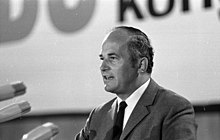Rainer Barzel
| Rainer Barzel | |
|---|---|

Barzel speaking at a 1969 CDU conference
|
|
| Federal Minister of All-German Affairs | |
|
In office 14 December 1962 – 11 October 1963 |
|
| Chancellor | Konrad Adenauer |
| Preceded by | Ernst Lemmer |
| Succeeded by | Erich Mende |
| Federal Minister of Intra-German Relations | |
|
In office 4 October 1982 – 29 March 1983 |
|
| Chancellor | Helmut Kohl |
| Preceded by | Egon Franke |
| Succeeded by | Heinrich Windelen |
| President of the Bundestag | |
|
In office 29 March 1983 – 25 October 1984 |
|
| Preceded by | Richard Stücklen |
| Succeeded by | Philipp Jenninger |
| Personal details | |
| Born | 20 June 1924 Braunsberg, East Prussia |
| Died | 26 August 2006 (aged 82) Munich, Bavaria |
| Nationality | German |
| Political party | CDU |
| Spouse(s) | Kriemhild (m. 1948 – d. 1980) Helga (m. 1983 – d. 1995) Ute (m. 1997 – 2006) |
| Children | Claudia |
| Alma mater | University of Cologne |
| Profession | Lawyer |
| Religion | Roman Catholicism |
Rainer Candidus Barzel (20 June 1924 – 26 August 2006) was a German politician of the CDU. He served as the 8th President of the Bundestag from 1983 to 1984.
Born in Braunsberg, East Prussia (present-day Braniewo, Poland), Barzel served as Chairman of the CDU from 1971 and 1973 and ran as the CDU's candidate for Chancellor of Germany in the 1972 federal elections, losing to Willy Brandt's SPD.
The 1972 election is commonly regarded as an indirect referendum on Chancellor Brandt's Ostpolitik (Eastern Policy), which called for normalized relations with East Germany and the Soviet Union, which Barzel vehemently opposed. On 27 April 1972 Barzel and the CDU/CSU called a constructive vote of no confidence against Brandt's government. Had the motion carried, Barzel would have succeeded Brandt as Chancellor of Germany. The implications of this vote were far-reaching. Brandt's initial reaction was that he, along with his policy of Ostpolitik, was finished. Several German trade unions went on strike in anticipation of his loss in the no confidence motion. However, the final tally received 247 votes; 249 were needed to expel Brandt from office. Later, it was found out that two members of Parliament, Julius Steiner (CDU) and Leo Wagner (CSU) had been bribed by the East German Ministry for State Security.
The government, in consideration of the fact that it had lost its parliamentary majority and that parliamentary work was stalled, reacted by calling new elections, which it won decisively. 1972 was the only time before 1998 and after World War II that the SPD outpolled the CDU, and it still represents the SPD's high-water mark as a vote share. That year's elections had the highest turnout ever.
...
Wikipedia
